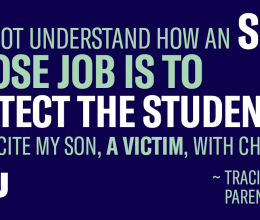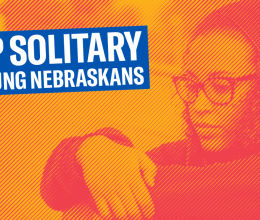
Protecting Their Health, Protecting Their Future
A Review of Nebraska School Policies & Practices for Pregnant and Parenting Students
ACLU of Nebraska Overview
The ACLU of Nebraska is a non-profit, non-partisan organization that works to defend and strengthen the individual rights and liberties guaranteed in the United States and Nebraska Constitutions through a sophisticated program of integrated advocacy with strategies that include litigation, negotiation, policy research, and public education. In 2016 we are proudly celebrating our 50th anniversary and are proudly supported by thousands of members and supporters stretching far across our great state.
Since 1972, the ACLU’s Women’s Rights Program has been working to secure gender equality and to ensure that all women and girls are able to lead lives of dignity, free from violence and discrimination. As such, the ACLU has worked tirelessly on the national level and in many states to ensure young people have a right to complete their education regardless of their sex or whether they become pregnant. This investigation was inspired by a review of an excellent treatment of this subject published by the ACLU of Northern California, Breaking Down Educational Barriers for California’s Pregnant and Parenting Students, in January 2015.[i]
The ACLU of Nebraska has long been a leader on gender equity issues. A few recent examples of our work on women's rights include helping to successfully lead the way for stronger equal pay laws and stronger protections for pregnant and breastfeeding employees in the legislative arena over the past two years. Pregnancy discrimination in public schools is illegal and we strongly believe that no young person should have to choose between completing their education and taking care of themselves and their children. This report is an extension of our work on gender equity, students’ rights, and reproductive freedom.
Legal and Policy Overview
Pregnant and parenting students face enormous challenges in accomplishing their educational goals. Approximately 70% of young women who give birth leave school, which impacts their financial and educational future as well as the financial and educational future of their children. Schools have a constitutional obligation to help pregnant and parenting teens stay in school. Pregnancy is a gender equity issue covered by Title IX. As such, under federal law, schools may not exclude or discriminate against students who are pregnant or parenting.
Unfortunately, many young women face subtle discrimination that may violate these clear protections through practices such as overly restrictive and inflexible absence and leave policies that impact prenatal doctor’s appointments or pediatrician visits; a school’s refusal to allow makeup work or alternative education for pregnant and parenting students; and a lack of facilities and accommodations for breastfeeding or milk expression. Young women have the right to complete their education regardless of whether they become pregnant. Students should not have to choose between completing their education and taking care of themselves and their children.
In the summer of 2016, the ACLU of Nebraska completed a first of its kind comprehensive investigation into the current policies and practices in place at each of Nebraska's 251 school districts that address the rights of pregnant and parenting students with consultation from Holland Children’s Movement.[ii] We issued open records requests to all 251 school districts in Nebraska to obtain information about their policies and practices for pregnant and parenting students. We interviewed advocates and caseworkers who provide social services and support to young parents, and we also collected stories from young Nebraskan women who recently experienced pregnancy while in school.
Our research uncovered wildly divergent levels of protection across the state and we have accordingly proposed solutions to ensure all students have the opportunity to succeed in school. We also identified a host of best practices in law and policy for additional consideration for Nebraska educational professionals, policymakers, and human service providers to ensure our schools are free of discrimination and doing all they can to end the push-out of pregnant and parenting students from their schools.
Rights and Protections for Pregnant and Parenting Students
Title IX of the Education Amendments of 1972 (“Title IX”) was enacted to prohibit sex discrimination in education.[iii] The statute is well-known for providing equality in athletic opportunities for women, but it also protects students from other forms of sex discrimination, such as discrimination based on pregnancy.[iv] Title IX ensures that pregnant students have a right to an education without discrimination related to pregnancy, giving birth, terminating a pregnancy, or recovering from childbirth.[v]
In 2013, the U.S. Department of Education Office for Civil Rights released guidance for school districts called “Supporting the Academic Success of Pregnant and Parenting Students Under Title IX of the Education Amendments of 1972.”[vi] As the U.S. Department of Education noted, “we must support pregnant and parenting students so that they can stay in school and complete their education, and thereby build better lives for themselves and their children.”
The guidance from the U.S. Department of Education noted several specific protections that every school should have in place for students to ensure pregnant students face no barriers:
- A school must excuse a student’s absences because of pregnancy or children for as long as the student’s doctor deems the absences are medically necessary.
- Special services or alternative learning opportunities made available to other temporary medical conditions must also be provided to pregnant students.
- When a student returns to school, she must be allowed to return to the same academic and extracurricular status as before her medical leave began.
- Educators should develop programs to actively support students’ ability to stay in school and return to school.
Some states, including Nebraska, have gone beyond the bare minimum required by the U.S. Department of Education and adopted state statutes or regulations to ensure uniform protection for students while they are pregnant and to support them when they return to school. Nebraska has enacted the Equal Opportunity in Education Act, which prohibits “The application of any rule which discriminates on the basis of a pregnancy of any person” in “any academic, extracurricular, research, occupational training, or other program or activity.”[vii]
Other jurisdictions have also adopted specific policies ensuring a private and hygienic place to express breast milk during the school day, programs to allow a student to continue schoolwork from home, and arrangements for childcare. We identify these policies as emerging best practices for schools to demonstrate their commitment to an education for all students—including parenting students.
Pregnancy and Educational Disparities
While teen pregnancy rates are generally on the decline, the U.S. teen pregnancy rate stubbornly remains substantially higher than the rates in other western industrialized nations.[viii]
The teen birth rate in the U.S. is 249,078 babies born to women aged 15-19 years, for a birth rate of 24.2 per 1,000 young women.[ix] The teen birth rate in Nebraska is even higher at 31.1 per 1,000 young women.[x]
For too many students, becoming pregnant and deciding to become a parent while trying to complete their education can be difficult even under the best of circumstances. Nationwide surveys suggest it is the number one reason young women drop out of school—approximately a third of female students who drop out of high school did so due to becoming pregnant.[xi] Once they leave, they are unlikely to return to school: only about 50% of teen mothers receive a high school diploma by 22 years of age, whereas approximately 90% of young women who do not give birth during adolescence graduate from high school.[xii] These statistics obscure an alarming reality: advocates and social workers who work with these young women consistently report that most parenting students want to stay in school and, if properly supported, can thrive in their academic work. In fact, parenthood frequently motivates students to focus on their future and achieve their educational goals. As one young woman told us, “Getting pregnant and being a parent gave me the motivation to do better in school because I wanted the best for my child, too.”
Anecdotal evidence from those who work with teen parents in Nebraska gathered as a part of this project indicates some Nebraska students drop out because of the array of institutional barriers they may face as well as the lack of proactive programs and information to aid the students to stay in school and achieve their educational goals.
The experience of young women who find themselves pregnant while in school are all very different, depending on the amount of support their school offers them. Compare these two students’ very different experiences:
“I was in AP classes and honor classes when I found I was pregnant. There were no programs, services, or accommodations for things as basic as needing to go to the bathroom more frequently. Only a few of my teachers were supportive. I felt the school was judgmental of teen parents and basically saw me as someone who was ‘already a failure’.”
“Overall, my school helped me get through a difficult time in my life. They gave me referral information to local services, and the school had a Head Start child care in the building so I was able to graduate high school on time and in the top half of my class.”
We intend this report to be a wake-up call across the political spectrum to ensure all Nebraskans work together to make it easier—not harder—for students to take care of themselves, their academic future, and their children.
While there is little concrete data on who becomes a teen parent in Nebraska, there are good models for data collection that could be adopted statewide. For example, Lincoln Public Schools voluntarily compiles information on student parents annually. The data includes information on both male and female parents, noting their ethnicity, whether they are in special education, whether they are economically disadvantaged, and whether they are English Language Learners. LPS then collects the rates at which students graduate, transfer, or dropped out.
Students who drop out of school experience an impact on their economic and career prospects. Nebraskans without a high school diploma have an average salary of $3,248 less than their peers who graduated.[xiii] Of course, lacking a high school diploma further means the young woman cannot obtain even an Associate’s Degree, which adds to the gap in earning capacity. The average Nebraskan salary for someone with an Associate’s Degree is $11,083 more than the Nebraskan without a high school degree.[xiv]
There are intergenerational implications for a student forced to drop out of high school as well. Research shows that the children of teen parents are more likely to drop out themselves: 66% of children born to teen mothers earn a high school diploma, compared to 81% of children born to non-teen moms. [xv]
Removing barriers to educational success for pregnant and parenting students will help to ensure each Nebraskan can contribute at their highest potential which will support self-sufficiency, limit dependence on safety net programs, grow our shared economy, and ensure strong families.
Current Landscape of Nebraska School District Policies for Pregnant and Parenting Students
In order to study the policies in place in Nebraska schools, the ACLU of Nebraska sent open records requests to all 251 school districts in the summer of 2016 and asked for the following:
- Any policies, rules, regulations or memos currently in force that relate to any school sponsored childcare programs for students who have an infant or child.
- Any policies, rules, regulations or memos currently in force that relate to attendance policies for students who are pregnant or parenting.
- Any policies, rules, regulations or memos currently in force that relate to absence and make up policies for students who are pregnant or parenting, including whether such students making up absences may participate in commencement and/or extracurricular activities.
- Any policies, rules, regulations, or memos currently in force that relate to any alternative education or independent study for students who are pregnant or parenting.
- Any policies, rules, regulations or memos currently in force that relate to breastfeeding accommodations for students.
- Any training materials for school personnel relating to pregnant or parenting teens that have been provided in the period January 2010 to present.
- Any data collection or tracking documents showing the number of pregnant or parenting teens in your district.
- Any handouts or written resources outlining available human services and referral agencies for students who are pregnant or parenting that are provided in your district.
See Appendix for more details on the process of conducting the survey.
Once we received materials from the districts, we reviewed the responses from each school district with four questions in mind to evaluate compliance with best practices in law and policy:
- Did the district have an absence policy that specifically anticipated and dealt with pregnancy to permit a pregnant student to attend prenatal medical appointments, be absent to give birth and recover, and to address post-birth pediatrician appointments?
- Did the district provide alternative methods to keep a pregnant or parenting student in school by allowing coursework at home, tutoring visits, online courses or similar supplement to the classroom?
- Did the district have a written policy for lactation accommodation in a private and hygienic place during the day?
- Did the district provide childcare either in the school or in collaboration with a provider in the community?
The results of our survey suggest significant inconsistencies across Nebraska’s many school districts in meeting best practices which would benefit from the establishment of statewide minimum standards in all four areas. However, it is also important to note that our research identified some excellent policies and practices deserving of commendation that can and should serve as models for other school districts in Nebraska.
Absence Policies
Pregnancy is a significant physical event. The U.S. Department of Education has mandated schools make adjustments to their normal practice to be accommodating of a student’s pregnancy. For example, the school may need to provide a larger desk, allow more frequent trips to the bathroom, or permit temporary access to elevators.[xvi] Federal law makes it clear that students might experience more absences as a result of pregnancy or recovery from childbirth and the school must permit these absences.[xvii]
Emerging best practices recommend absence policies that offer additional absences for pregnant and parenting students beyond the rigid number of permitted absences all other students get per semester. After all, a student who is a parent faces double the possibility of an absence—both her own illness and her child’s illness. A rigid policy providing only the same number of absences to all students is not adequate accommodation for a student who is involved in prenatal appointments, recovering from a pregnancy, and later caring for a child who may have medical needs. A student who gave birth last year told us, “I had many doctor appointments because I had a difficult pregnancy. I missed so much school that I lost all my credits that semester. There wasn’t any flexibility; it was very difficult.”
In our survey, we determined that only 46% of Nebraska school districts have an absence policy that specifically mentions pregnancy. The remaining 54% of districts have absence policies but do not address pregnancy.
Absence policies in Nebraska are widely divergent. State law requires a district to contact the County Attorney to report a student who has been absent for 20 days.[xviii] At the same time, school districts are permitted to develop their own definition of excessive absenteeism. Our survey revealed these local limits range from 5, 7, 9, 10, 12 to 15 days of absence.
We discovered that many districts have absence policies in conflict with federal law. Over 30% of districts have inappropriate policies requiring a doctor’s note to return to school.
For example, we uncovered absence policies that include the following language, “the student shall resume classes upon the recommendation of her physician,” or “A physician’s formal approval for participation in education activities may be required.” Federal law is clear: young women must be permitted to return automatically to resume their education when they are ready, without barriers such as requiring a doctor’s note. Schools may only have a doctor’s note requirement if they require the same documentation for all other students who were absent for another medical reason; pregnancy cannot be treated differently than a student who was absent for a broken leg, the flu, or pink eye. [xix]
A few Nebraska school districts had a similar barrier for pregnant students’ participation in extracurricular activities by requiring a doctor’s note. A common policy we saw included language such as “Participation in extracurricular activities will be considered on an individual basis.” The U.S. Department of Education has summed up the legal landscape regarding these types of potential barriers very clearly, “Title IX prohibits a school from excluding a pregnant student from any part of its educational program, including all extracurricular activities, such as school clubs, academic societies, honors programs, homecoming court, or interscholastic sports.”[xx]
Over 20 districts reported they treat pregnancy as a temporary disability under Section 504 rather than have a pregnancy-specific absence policy.
Under this framework, each young woman’s pregnancy would be dealt with in the same manner a special education student’s needs are handled: staff, the student, and her family would meet for an individualized assessment of her needs and then create an Individualized Educational Plan (“IEP”). While we applaud these districts’ decision to at least have a flexible plan in place for pregnant students (in contrast to the 55% of districts without any mention of pregnancy), this course of action does not comport with best practices established by federal law. The U.S. Department of Education has said: “An uncomplicated pregnancy, by itself, does not constitute a physical impairment and therefore is not considered a disability under Title II or Section 504. Complications resulting from pregnancy may be impairments. Whether a student with a complication resulting from pregnancy is protected under Section 504 and Title II depends on whether the complication is an impairment that substantially limits a major life activity, or alternatively, whether the student has a record of or is regarded as having such impairment.”[xxi]
We believe each district should carefully evaluate their treatment of these issues and update all policies and practices to ensure clear and consistent absence policies that specifically anticipate the needs of pregnant and parenting students in compliance with federal and state law. In the alternative, we believe minimum statewide standards on these matters should be established by the appropriate authorities.
Alternative Coursework
Young women who are pregnant may be able to attend school through the duration of their pregnancies—but some may need time off even during the prenatal period. We explored whether districts offered options for making up missed work such as retaking a semester, taking an online course, working with a visiting tutor, or other solutions. Having such options can make all the difference for a student’s chance of success: “A tutor came to my house multiple times during the week and brought me my homework and tests to work on. I worked on as much homework as I could and was able to bring my failing grades up and passed my junior year.”
Federal law sets forth a minimum requirement for students who wish to continue their education during pregnancy: “Title IX requires a school to provide the same special services to a pregnant student that it provides to students with temporary medical conditions. For example, if a school provides at-home instruction or tutoring to students who miss school because of temporary medical conditions, it must do the same for a student who misses school because of pregnancy or childbirth.”[xxii] While this is the minimum requirement, the Department of Education has suggested some additional ideas worthy of consideration to fully support pregnant and parenting students. For example, “Consider allowing pregnant or parenting students to engage in online coursework to complete high school courses at home during an excused leave of absence.”[xxiii]
78% of Nebraska districts have no policies or written guidelines on providing alternative education methods to pregnant or parenting teens.
Many Superintendents informed us that despite the lack of written policies, they would work with individual students to ensure educational support and success. We know Nebraska educational professionals are committed to their students and to their academic success so we take them at their word. However, this offer of support would be better understood and implemented through formal written policies to ensure clarity and security for students worried about their academic future and uniformity in an application by educational professionals.
We believe each district should carefully evaluate their treatment of these issues and update all policies and practices to ensure clear and consistent alternative coursework policies that specifically anticipate the needs of pregnant and parenting students in compliance with federal and state law. In the alternative, we believe minimum statewide standards on these matters should be established by the appropriate authorities.
Breastfeeding Accommodations
Nebraska has led the way in recent years in establishing strong protections for women to ensure lactation accommodation and to prevent discrimination among breastfeeding mothers. We have clear state law protections for women who are breastfeeding in public and for employees who must express milk during the workday.[xxiv] Unfortunately, there is a gap in that protection for students who will need to express milk during the school day. The U.S. Department of Education has recommended all districts “Designate a private room for young mothers to breastfeed, pump milk, or address other needs related to breastfeeding during the school days.”[xxv] Women who are nursing may need to express milk as frequently as every two to three hours. Students moving between classes cannot be expected to accomplish breast pumping between school bells; they need both the time to express milk and a private, clean place to do so.
Only 17% of school districts had written policies providing for students’ need to express milk.
The majority of districts had written policies covering employees’ lactation, and several Superintendents responded that they would apply the same protections to their students. Some districts had no policy but provided us with helpful information to understand their practices to support breastfeeding students. For example, one school told us, “We have a designated area in our full-time school nurse’s office that provides privacy as well as a sanitary & comfortable environment.” The key is to ensure an option is available. One young woman told us, “If there was an option for breast milk expression, I was never made aware of it.” Another said, “They let me go down to the nurse's office whenever I needed to pump, but they didn't have a designated room for pumping. I had to pump in the nurse’s restroom. Would you want YOUR lunch prepared in a restroom?”
We believe each district should carefully evaluate their treatment of lactation accommodation issues and update all policies and practices to ensure clear and consistent policies that specifically anticipate the needs of pregnant and parenting students in compliance with federal and state law. In the alternative, we believe minimum statewide standards on these matters should be established by the appropriate authorities.
Childcare
While Title IX does not require a school to either provide child care for a student’s baby nor require the school to assist the student in locating child care, the U.S. Department of Education recommends it as an emerging best practice that will ensure the parenting student has the support they need to stay in school. In-school child care programs are the gold standard to ensure a parenting student will be able to continue her education, but “Even schools that cannot house a child care center can help pregnant and parenting students locate and secure high-quality, affordable early learning programs and services and connect parenting students with available resources in the community.”[xxvi]
Nebraska is particularly fortunate to contain more in-school child care providers than many similarly situated states, mostly thanks to the public-private partnership of the Sixpence Early Learning Fund. Started by the Nebraska Legislature in 2005, Sixpence provides parent education programs across the state to improve teen parents’ understanding of how to raise a child and ensure best early learning opportunities for the infant. In some districts, Sixpence has provided actual childcare so the student parent could return to school, secure in the knowledge that her infant was in a high quality and affordable early education setting. Sixpence programs are provided from Alliance to Winnebago and are fantastic models for additional school districts’ consideration and adoption.
The security offered to a young woman who knows her baby is being cared for in a child care allows her to refocus her attention on her studies. Many young women credited their school’s in-house child care with their graduation success story: “My son stayed in the school’s Head Start program until he was ready for Kindergarten and that allowed me to be in school all day every day to finish in 4 years. My son is now 6 years old. His father and I are still together. I work full time and we just bought our second house. I couldn’t have done it without the supportive staff at my school.”
Over 90% of Nebraska schools have no provision to help parenting students with childcare needs.
While schools in Omaha and Lincoln have multiple in-school child care options, the service is not limited to only large metropolitan areas. For example, Falls City school district offers in-school child care.
A few districts provided the referral materials they offer a student when they become aware of her pregnancy, and these often included child care options as well as local healthcare services, brochures on parenting skills, and similar written information. School staff is likely to be in a much better position to direct the young woman to relevant social services than anyone else. One student told us, “My counselor also told me about programs where you could get free diapers and clothing for my baby. This was such great help, as I didn’t know about it otherwise.”
We believe each district should carefully evaluate their treatment of child care services or referral issues and update all policies and practices to ensure clear and consistent policies that specifically anticipate the needs of pregnant and parenting students in compliance with federal and state law. In the alternative, we believe minimum statewide standards on these matters should be established by the appropriate authorities.
Policy Recommendations
In addition to encouraging individual school districts to utilize this important opportunity to review their policies and practices we believe the time is ripe for policymakers in Nebraska to conduct further review and analysis of the following policy reform solutions to ensure young women are not unlawfully discriminated against and to ensure all pregnant and parenting students have the support they need to succeed in meeting their educational goals. Reform solutions include the following:
The Legislature should amend state law to allow for additional school-day-absences per semester for pregnant and parenting teens. This should apply to both male and female students who are parents. Students would need to provide documentation showing they have a child who needs their care but would not require a doctor’s note.
The Legislature should amend state law to provide students with maternity leave. Students would need to provide documentation of the birth of their child.
The Legislature should require data collection so policymakers have more detailed information on how many teens are pregnant and what percentage of such teens drop out of school. Data collection should include the race/ethnicity of the student, whether the student was receiving special education support or had an Individualized Educational Plan (“IEP”), whether the student qualified for the free or reduced school meal program, the student’s specified reason for leaving and other data points to identify the students in need of support.
The Legislature should amend existing lactation accommodation statutes to specifically include students.
The Legislature should continue the work of the Intergenerational Poverty Task Force to provide more in-depth analysis and evaluation of current state programs and identify existing gaps from a two-generation approach.
The State Department of Education should develop model policies for all districts’ adoption that specifically anticipate and provide for pregnancy absences and eliminate requirements for doctor’s approval to return to school or participate in extracurricular activities.
The State Department of Education should offer training for teachers, counselors, and administrators on the rights for pregnant and parenting teens to receive a quality education.
The State Department of Education should develop model lactation accommodation policies for all districts’ adoption that would ensure students have private, hygienic spaces to express breast milk during the school day.
The State Department of Education should develop regulations instructing school districts to identify and collaborate with local childcare providers if they do not have an in-school child care; districts should designate a staff person to actively aid students in placing their children with a childcare provider.
Conclusion
We believe support for pregnant and parenting students is strong across the political spectrum. These students should not face policy or practice barriers at their schools that encourage them to drop out or feel that they are being pushed out. Students should not have to choose between completing their education and taking care of themselves and their children. Meaningful chances of success in the lives of young people are rooted in access to educational opportunities. Nebraska should ensure young parents and their children are given the opportunity to develop strong families poised to succeed, which benefits all Nebraskans now and for generations to come.
Acknowledgements
This project could not have been completed without the assistance of several student researchers who reviewed district policies, researched best practices and compiled reference materials. We thank Ivy Lutz, Lee Kreimer, and Casie Youngberg for their many hours of work.
This report and related research was made possible through the support of the Coalition for a Strong Nebraska.
Appendix: Methodology
Of the 251 school districts, four were ultimately exempted from producing materials: Crawford Public Schools Superintendent requested an exemption due to a recent, serious medical crisis. Pine Ridge Job Corps was exempted as a nontraditional vocational training school. Two tribal schools were exempted due to concerns regarding their status with the separate sovereign nations.
The requests were mailed on July 1st in order to avoid disruption to the academic year responsibilities of district employees. Nebraska law requires responses to open records requests within four days, but we gave all districts an extension until August 26th if they preferred to compile the information after the summer break.
The open records request sought the policies and relevant documents relating to pregnant students as well as sex education curriculums. The study of the sex education curriculums is being compiled for a separate report that will be released at a later date.
As to process, we note with concern that over half of the districts initially responded with a refusal to comply with the state open record law unless they received significant sums to produce the records. The demand for payment ranged from a few hundred dollars to Conestoga School District in Murray who initially demanded $71,225 to produce any records. While government agencies responding to open records requests may charge for photocopying and for staff time if a search lasts longer than four hours, there clearly is no basis for a school district to resist production of existing policies. We found it very alarming that such a large number of districts demonstrated an initial resistance to transparency. Further discussion about the obligations of schools to comply with the public records statute resulted in the provision of the records with reasonable, modest copying charges from a few districts.
Ultimately, all districts responded save for seven smaller school districts. These districts had an original letter mailed in July, an email sent in September and a personal phone call to the Superintendent in October. For the purposes of concluding our report, we proceeded without any pregnancy policies response from these districts.[xxvii]
[i] https://www.aclunc.org/publications/breaking-down-educational-barriers-californias-pregnant-parenting-students
[ii] The Holland Children’s Institute has documented the number of Nebraska families living in poverty and the need to improve outcomes for children. http://www.hollandchildrensinstitute.com/children_s_budget_report
[iii] Title IX of the Educational Amendments of 1972, 20 U.S.C. § 1681 (2012).
[iv] Emily McNee, Pregnancy Discrimination in Higher Education: Accommodating Student Pregnancy, 20 Cardozo J.L. & Gender 63 (2013)
[v] 34 C.F.R. 106.40(b)(1)(2013)
[vi] U.S. Department of Education, “Supporting the Academic Success of Pregnant and Parenting Students Under IX of the Education Amendments,” 2013. http://www2.ed.gov/about/offices/list/ocr/docs/pregnancy.pdf
[vii] Neb. Rev. Stat 79-2,116
[viii] http://www.cdc.gov/teenpregnancy/about/
[ix] Id., citing 2014 birth rates, which is the most recent year with data.
[x] U.S. Department of Health and Human Services: Nebraska Adolescent Reproductive Health Facts. http://www.hhs.gov/ash/oah/adolescent-health-topics/reproductive-health/teen-pregnancy/trends.html
[xi] U.S. Department of Education, Id., p. 3
[xii] Id., p. 3
[xiii] National Information Center for Higher Education Policymaking and Analysis. “Difference in Median Earnings Between a High School Diploma and an Associate’s Degree.” http://www.higheredinfo.org/dbrowser/?level=nation&mode=data&state=0&submeasure=364
[xiv] Id.
[xv] T.L Dukewich, J.G Borkowski, T.L Whitman. “A longitudinal analysis of maternal abuse potential and developmental delays in children of adolescent mothers.”Child Abuse Negl, 23 (1999), pp. 405–420
[xvi] U.S. Department of Education, Id., p. 9
[xvii] “In the case of a recipient which does not maintain a leave policy for its students, or in the case of a student who does not otherwise qualify for leave under such a policy, a recipient shall treat pregnancy, childbirth, false pregnancy, termination of pregnancy and recovery therefrom as a justification for a leave of absence for so long a period of time as is deemed medically necessary by the student's physician, at the conclusion of which the student shall be reinstated to the status which she held when the leave began.” 34 C.F.R. 106.40(b)(5).
[xviii] Neb. Rev. Stat. 79-209
[xix] 34 CFR 106.40(b)(2): “A recipient may require such a student to obtain the certification of a physician that the student is physically and emotionally able to continue participation so long as such a certification is required of all students for other physical or emotional conditions requiring the attention of a physician.”
[xx] 34 C.F.R. 106.40(b)(1).
[xxi] U.S. Department of Education, Id., FN 2, citing 34 CFR 104.3(j); 28 C.F.R. 35.104. See also 29 C.F.R. part 1630. App. 1630.2(h).
[xxii] Id., p. 10
[xxiii] Id., p. 17
[xxiv] Neb. Rev. Stat. 20-170 and Neb. Rev. Stat. 48-1102
[xxv] Id., p. 16
[xxvi] Id., p. 20
[xxvii] The schools who did not respond were: Clarkson Public Schools in Clarkson, Neligh-Oakdale Schools in Neligh, Pierce Public Schools in Pierce, Springfield Platteview Community Schools in Springfield, St. Edward Public Schools in St. Edward, Stapleton Public Schools in Stapleton and Wheeler Central Schools in Bartlett.
Related content


A School Police Officer Can Do More Harm Than Good
February 14, 2019
From the Classroom to the Courtroom: A Review of Nebraska's School...
December 28, 2018ACLU Unveils Investigative Report on Nebraska’s School Police Programs
December 20, 2018
Title X in Nebraska
March 20, 2018
Open Letter to Nebraska Superintendents on Student Walkouts
March 13, 2018ACLU Applauds Introduction of Bill Limiting Solitary Confinement...
January 5, 2018
I spent my 16th Birthday Alone in a Cell
January 5, 2018
